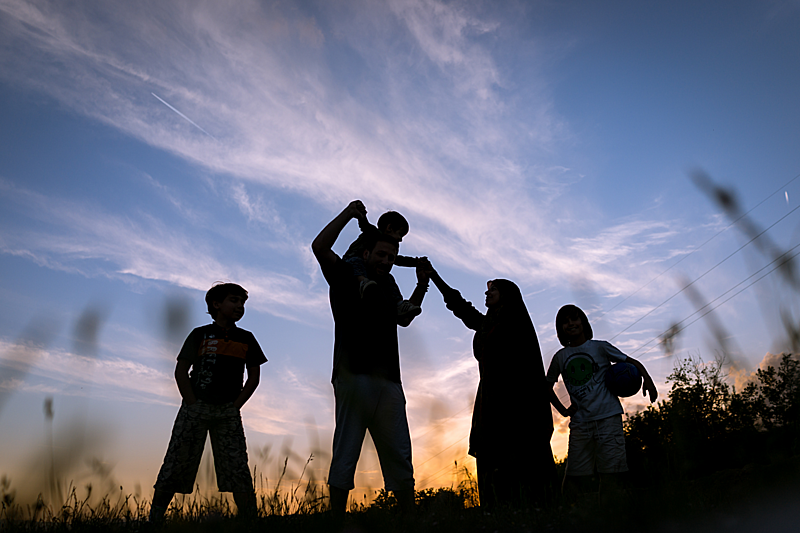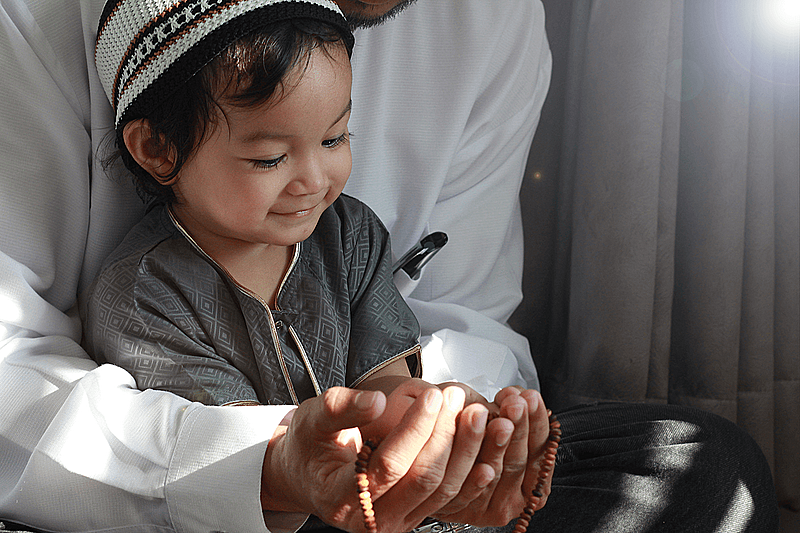How To Build Healthy Family Relationships
5 Ways To Build Healthy Family Relationships
According to modern sociologists, the concept of family institution is a core unit in society, and its multiple functions make it a much-needed institution in societal structure. The family's primary functions include the reproduction of new members, and their socialisation, as well as the provision of emotional and physical care for elderly and young people.[1]
This view is not much different from the family institution according to the Islamic perspective. It has been mentioned in verse 1 of Surah An-Nisa, explaining the meaning of family institution from the divine lens. Allah says in the Quran,
يَٰٓأَيُّهَا ٱلنَّاسُ ٱتَّقُواْ رَبَّكُمُ ٱلَّذِي خَلَقَكُم مِّن نَّفۡسٖ وَٰحِدَةٖ وَخَلَقَ مِنۡهَا زَوۡجَهَا وَبَثَّ مِنۡهُمَا رِجَالٗا كَثِيرٗا وَنِسَآءٗۚ وَٱتَّقُواْ ٱللَّهَ ٱلَّذِي تَسَآءَلُونَ بِهِۦ وَٱلۡأَرۡحَامَۚ إِنَّ ٱللَّهَ كَانَ عَلَيۡكُمۡ رَقِيبٗا
"O Humankind! Be conscious of your Sustainer, who has created you out of one living entity, and out of it created its mate, and out of the two spread abroad a multitude of men and women. And remain conscious of Allah, in whose name you demand (your rights) from one another, and of these ties of kinship. Verily, Allah is ever watchful over you!"
(Surah An-Nisa, 4:1)
In this verse, Allah gives a lovely and clear image of the family institution according to the Creator's view, where Allah created man and woman from the same source of creation. Through the sacred bond of marriage between the two, children are born as a sign of love and affection between husband and wife, not only as the successor of the family lineage but also as continuity for human survival.
The difference is that the institutional system in the Muslim family also requires the members of this family to be pious and always maintain the bond of kinship (silaturrahim) between them.
Indeed, silaturrahim is not possible except by establishing a harmonious family in the footsteps of the Prophet s.a.w. and under the guidance of the Quran. The Prophet's life is a wonderful example of how to raise a happy family, as he was a husband, father, and grandfather, as Allah s.w.t. says in the Quran,
لَّقَدْ كَانَ لَكُمْ فِى رَسُولِ ٱللَّهِ أُسْوَةٌ حَسَنَةٌ لِّمَن كَانَ يَرْجُوا۟ ٱللَّهَ وَٱلْيَوْمَ ٱلْـَٔاخِرَ وَذَكَرَ ٱللَّهَ كَثِيرًا
"Indeed, in the Messenger of Allah, you have the best model to follow."
(Surah Al-Ahzab, 33:21)
The Quran, on the other hand, leads us through many inspirational stories as guidance and lessons to learn from. Allah describes that nicely in the following verse,
لَقَدۡ كَانَ فِي قَصَصِهِمۡ عِبۡرَةٞ لِّأُوْلِي ٱلۡأَلۡبَٰبِۗ مَا كَانَ حَدِيثٗا يُفۡتَرَىٰ وَلَٰكِن تَصۡدِيقَ ٱلَّذِي بَيۡنَ يَدَيۡهِ وَتَفۡصِيلَ كُلِّ شَيۡءٖ وَهُدٗى وَرَحۡمَةٗ لِّقَوۡمٖ يُؤۡمِنُونَ
"There was certainly in their stories a lesson for those of understanding. Never was the Quran a narration invented, but a confirmation of what was before it and a detailed explanation of all things and guidance and mercy for a people who believe."
(Surah Yusuf, 12:111)
In this article, I will share five tips on how to build healthy family relationships according to the Islamic point of view.
Expressing Love Among Family Members
One of the essential ways to build a happy and harmonious family is to express our affection to the people we love such as our children and spouses.
For example, we can call our beloved wife or husband by names they like. The Prophet s.a.w. used to call his beloved wife, Aishah r.a, 'Humairaa' or 'the little rosy one', referring to her complexion and beauty.[2]
Similarly, when we interact with our children, we choose beautiful words when speaking to them, especially when advising them or teaching them to heed Allah’s commands. In Surah Luqman, verse 13, Luqman Al-Hakim advised his son with words that are pleasant to hear:
وَإِذۡ قَالَ لُقۡمَٰنُ لِٱبۡنِهِۦ وَهُوَ يَعِظُهُۥ يَٰبُنَيَّ لَا تُشۡرِكۡ بِٱللَّهِۖ إِنَّ ٱلشِّرۡكَ لَظُلۡمٌ عَظِيمٞ
"And (mention, O Muhammad), when Luqman said to his son while he was instructing him, "O my (beloved) son, do not associate (anything) with Allah. Indeed, association (with him) is a great injustice."
(Surah Luqman, 31:13)
Luqman's devotion towards his son is reflected here through the words of 'bunayya' (my dear child); Allah is showing that educating a person, particularly a child, should be based on love and tranquillity.[3]
Similar things may be seen in how the Prophet s.a.w. educated his Companions r.a. through his interactions with Mu'adh bin Jabal r.a, who was still an adolescent at the time. It was narrated that Mu'adh ibn Jabal r.a. reported:
أنَّ رسولَ اللَّه صلَّى اللَّه علَيهِ وسلَّمَ أخذَ بيدِهِ، وقالَ: يا مُعاذُ، واللَّهِ إنِّي لأحبُّكَ، واللَّهِ إنِّي لأحبُّك، فقالَ: أوصيكَ يا معاذُ لا تدَعنَّ في دُبُرَ كلِّ صلاةٍ تقولُ: اللَّهمَّ أعنِّي على ذِكْرِكَ، وشُكْرِكَ، وحُسنِ عبادتِكَ
The Messenger of Allah, peace and blessings be upon him, took me by the hand and he said, "O Mu'adh, I swear by Allah that I love you. I swear by Allah that I love you. O Mu'adh, I advise you not to forget supplicating after every prayer by saying: O Allah, help me to remember you, to give thanks to you, and to worship you in the best manner."
(Sunan Abi Daud)
On this note, constantly expressing love in our daily interactions with our family not only strengthens the relationship but also helps to build harmony within the family and facilitate the process of reminding each other in matters of goodness.
Treating Our Family With Ihsan
Being kind to people begins with the immediate family: our parents and siblings. This is followed by other members in the community in need such as orphans, the poor and needy, neighbours, widows and others as enshrined in the Quran:
وَٱعۡبُدُواْ ٱللَّهَ وَلَا تُشۡرِكُواْ بِهِۦ شَيۡٔٗاۖ وَبِٱلۡوَٰلِدَيۡنِ إِحۡسَٰنٗا وَبِذِي ٱلۡقُرۡبَىٰ وَٱلۡيَتَٰمَىٰ وَٱلۡمَسَٰكِينِ وَٱلۡجَارِ ذِي ٱلۡقُرۡبَىٰ وَٱلۡجَارِ ٱلۡجُنُبِ وَٱلصَّاحِبِ بِٱلۡجَنۢبِ وَٱبۡنِ ٱلسَّبِيلِ وَمَا مَلَكَتۡ أَيۡمَٰنُكُمۡۗ إِنَّ ٱللَّهَ لَا يُحِبُّ مَن كَانَ مُخۡتَالٗا فَخُورًا
"Worship Allah and associate nothing with Him, and to parents do good, and to relatives, orphans, the needy, the near neighbour, the neighbour farther away, the companion at your side, the traveller, and those whom your right hands possess. Indeed, Allah does not like those who are self-deluding and boastful."
(Surah An-Nisa, 4:36)
Treating our parents with Ihsan means being kind to them, following all their commands as long as it is not against the religion, always making them happy, and not making them feel sad and discouraged.
Besides that, there are also other hadith that touches on the benefits of being kind to orphans and the poor as stated in the following hadith,
السَّاعِي علَى الأرْمَلَةِ والمِسْكِينِ كالْمُجاهِدِ في سَبيلِ اللَّهِ، أوْ: كالَّذِي يَصُومُ النَّهارَ ويقومُ اللَّيْلَ
"A giver of maintenance to the widows and the poor is like a giver in the way of Allah, an utterer of prayers all night and fasting during the day."
(Sahih Al-Bukhari)
Accordingly, Muslim scholars also mentioned that in doing good to the neighbours, orphans, poor and widows, the utmost priority is to our parents who are in difficulty, followed by our siblings.
Doing good to orphans should begin first with our children. If our child has lost his or her spouse, we should take care of their children who are considered orphans.
How can our family be intact and harmonious, if we are too occupied with others to the extent that our own family is neglected? Start doing good among our own family members, then to others.
Respecting our spouses by practising consultative leadership (Syura)
A healthy and harmonious family is a household that practices consultation in deliberating critical family decisions. The encouragement of this positive practice in marriage was stated clearly in Surah Al-Baqarah, verse 233.
وَٱلۡوَٰلِدَٰتُ يُرۡضِعۡنَ أَوۡلَٰدَهُنَّ حَوۡلَيۡنِ كَامِلَيۡنِۖ لِمَنۡ أَرَادَ أَن يُتِمَّ ٱلرَّضَاعَةَۚ وَعَلَى ٱلۡمَوۡلُودِ لَهُۥ رِزۡقُهُنَّ وَكِسۡوَتُهُنَّ بِٱلۡمَعۡرُوفِۚ لَا تُكَلَّفُ نَفۡسٌ إِلَّا وُسۡعَهَاۚ لَا تُضَآرَّ وَٰلِدَةُ بِوَلَدِهَا وَلَا مَوۡلُود لَّهُۥ بِوَلَدِهِۦۚ وَعَلَى ٱلۡوَارِثِ مِثۡلُ ذَٰلِكَۗ فَإِنۡ أَرَادَا فِصَالًا عَن تَرَاضٖ مِّنۡهُمَا وَتَشَاوُرٖ فَلَا جُنَاحَ عَلَيۡهِمَاۗ
"Mothers may breastfeed their children two complete years for whoever wishes to complete the nursing (period). Upon the father are the mothers' provision and their clothing according to what is acceptable. No person is charged with more than their capacity. No mother should be harmed through her child and no father through his child. And upon the (father's) heir is (a duty) like that (of the father). And if they both desire to wean through mutual consent from both of them and consultation, there is no blame upon either of them."
(Surah Al-Baqarah, 2:233)
Although this verse mentioned that the best practice of breastfeeding is for two years, Allah s.w.t. does not prevent married couples from reducing the breastfeeding period, particularly for the mother's well-being. This is provided that both of them have discussed and agreed. According to Muslim jurists, this is evidence that husband and wife should discuss any vital matters in marriage.

In the life of the Prophet s.a.w, there are times when Rasulullah s.a.w. himself would receive advice from his wife, Khadijah r.a. For example, during the beginning of the revelation, it was Khadijah who often gave encouragement to the Prophet and suggested that the Prophet meet her uncle, Waraqah bin Nawfal who was a Christian pastor and a follower of Prophet Isa's a.s. teachings.
Similarly, in the event where the Prophet had ratified the treaty of Al-Hudaibiyyah, he told his companions to end the state of Ihram that they had entered to perform 'Umrah. He instructed his Companions to get up, slaughter their sacrificial animals, and shave their heads, but none of them got up. He told them three times to do this, but not one of them responded.
He then went to his wife Umm Salamah and told her what he was facing from the people. She told him,
يَا نَبِيَّ اللَّهِ، أَتُحِبُّ ذَلِكَ اخْرُجْ ثُمَّ لاَ تُكَلِّمْ أَحَدًا مِنْهُمْ كَلِمَةً حَتَّى تَنْحَرَ بُدْنَكَ، وَتَدْعُوَ حَالِقَكَ فَيَحْلِقَكَ
"O Prophet of Allah. Do you want your order to be carried out? Go out and do not speak to any of them until you have sacrificed your animal and call your barber to shave your head."
(Sahih Al-Bukhari)
The Prophet took her advice and did as she suggested. When the companions saw that, they rushed to sacrifice their animals, pushing one another aside, and some of them began to shave one another's heads until they were almost fighting with one another because of their distress, grief and regret for having disobeyed the Prophet.[4]
Read: 3 Things to Know about The Story of Hudaibiyah
Therefore, this is the best practice advocated by the Quran and the Prophetic guidance in dealing with our spouses in our daily interactions. If Prophet Muhammad s.a.w, the best person in the universe, does so, why shouldn’t we?
Honouring Elders and Loving The Young One In The Family
In forging a harmonious family, respecting the elderly and loving the young are important religious principles. This encouragement can be seen in the following hadith,
لَيْسَ مِنَّا مَنْ لَمْ يَرْحَمْ صَغِيرَنَا وَيُوَقِّرْ كَبِيرَنَا وَيَأْمُرْ بِالْمَعْرُوفِ وَيَنْهَ عَنِ الْمُنْكَرِ
"He does not belong to us who does not show mercy to our young ones and respect to our old ones, who does not recommend what is reputable and prohibits what is disreputable."
(Sunan At-Tirmizi)
As a son or a daughter, we need to realise that parents are the reason we are in this world. Let us remember Allah's command in Surah Al-Isra:
وَقَضَىٰ رَبُّكَ أَلَّا تَعۡبُدُوٓاْ إِلَّآ إِيَّاهُ وَبِٱلۡوَٰلِدَيۡنِ إِحۡسَٰنًاۚ إِمَّا يَبۡلُغَنَّ عِندَكَ ٱلۡكِبَرَ أَحَدُهُمَآ أَوۡ كِلَاهُمَا فَلَا تَقُل لَّهُمَآ أُفّٖ وَلَا تَنۡهَرۡهُمَا وَقُل لَّهُمَا قَوۡلٗا كَرِيمٗا
"And your Lord has decreed that you not worship except Him, and to parents, good treatment. Whether one or both of them reach old age (while) with you, say not to them (so much as), "uff," and do not repel them but speak to them a noble word."
(Surah Al-Isra, 17:23)

Likewise, children need to be taught to love their siblings. As a parent, we do not want our children quarrelling and fighting when we are gone. It is the reality that unfortunately happens in some families. The importance of mutual respect and love for family members is paramount in ensuring the ties of kinship (silaturrahim) in the family.
On the other hand, those who break the bond of kinship due to the loss of respect and love between families are considered to have closed the door to heaven, as our Prophet Muhammad s.a.w. once said,
لاَ يَدْخُلُ الْجَنَّةَ قَاطِعُ رَحِمٍ
"Those who sever ties will not enter Paradise."
(Sahih Al-Bukhari)
Forming Pious Families
In the end, it is the responsibility of parents to form a successful and harmonious family not only for this world but also for the Hereafter. This is possible by building a family that has a good relationship with Allah and fellow human beings.
With the mercy and compassion that we demonstrate to the family, we showcase mutual love and respect to them. Forging a close relationship with the family will ultimately help in building a pious family as recorded in the following prayer:
وَٱلَّذِينَ يَقُولُونَ رَبَّنَا هَبۡ لَنَا مِنۡ أَزۡوَٰجِنَا وَذُرِّيَّٰتِنَا قُرَّةَ أَعۡيُنٖ وَٱجۡعَلۡنَا لِلۡمُتَّقِينَ إِمَامًا
“And those who say, "Our Lord, grant us from among our wives and offspring comfort to our eyes and make us an example for the righteous."
(Surah Al-Furqan, 25:74)
For that, parents need to play an active role in instilling a positive environment in their family by doing simple religious activities together, i.e. praying together, fasting together or even reciting Dua together. Children should also be constantly reminded of Prophetic morality through inspirational stories from the Sirah (Historical biography) of the Prophet s.a.w. as life lessons.
After everything we have done, let us increase our prayers so that our children become righteous and pious believers, who will always remember Allah and worship Him. Allah is the best place for us to seek help and convey all our prayers.

One of the Dua that we can practice is the Dua prayed by Prophet Ibrahim a.s. for his children and his descendants to constantly perform their prayer to Allah. As recorded in the Quran:
رَبِّ ٱجۡعَلۡنِي مُقِيمَ ٱلصَّلَوٰةِ وَمِن ذُرِّيَّتِيۚ رَبَّنَا وَتَقَبَّلۡ دُعَآءِ
“My Lord, make me an establisher of prayer, and (many) from my descendants. Our Lord, and accept my supplication.”
(Surah Ibrahim, 14:40)
Hopefully, by practising these five tips, we will be able to form healthy, harmonious and pious families, successful both in this world and the Hereafter. Amin.
[1] https://www.un.org/esa/socdev/family/Publications/mtintro.pdf
[2] Al-Mubarak bin Muhammad Ibn al-Athir, al-Nihaya fi Gharib al-Hadith wa al-Athar, vol. 1, (Beirut: al-Maktabah al-‘Ilmiyyah, 1979), vol.1,438.
[3] Muhammad Quraish Shihab, Tafsir Al-Mishbah, (Jakarta: Penerbit Lentera Hati, 11th edn., 2011), vol.10,298.
[4] Ibn Qayyim Al-Jawziyya, Zad Al-Ma’ad Fi Khair Al-’Ibad

